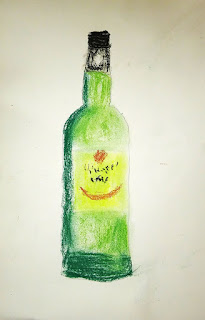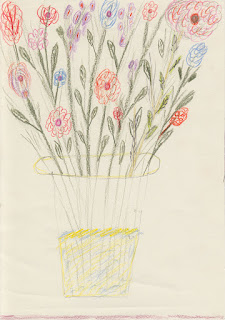OK - as much as I'd like to - I can't actually fit any of
those items into the Downham Market Methodist Church.
Not even the main hall. Well, maybe automobiles...
So it's going to have to be the sequel.
For my third art workshop with the Downham Market Stroke Association
I'm thinking Still Life - Flowers, Coffee pots and Whiskey bottles!
I realise I can't just turn up and expect people to take on that
dreaded blank piece of paper without any help. I often find it a
challenge myself, but using the 'skin of my teeth' method
as I often do, I was running out of time.
I quickly designed a few 'How to Draw' guidance sheets,
hoping they'd make sense. If not I was on hand to help...
I find when it comes to drawing most people say they can't draw.
Or haven't drawn anything since who knows when!
There's a great misunderstanding I think (for me too), that drawing
means producing something of photographic accuracy - which can
certainly be extremely daunting, if not stop you in your tracks entirely.
I make it clear that if we wanted a photo we'd use a camera.
When drawing we want to capture the spirit of the subject or object.
We all know what a bottle or a vase of flowers looks like so we just
need a suggestion or an indication - and we all see things differently.
As viewers we can participate by filling in the blanks as it were
- thereby completing the picture as we see it.
As it turned out, most people didn't need my help after all, but just got
on with it. The results you can see are excellent. Strong command of line
and shape, and also confident use of colour and contrast.
I feel the most important aspect of this and any creative exercise is
that, regardless of how the end result is perceived - enjoy yourself!
on with it. The results you can see are excellent. Strong command of line
and shape, and also confident use of colour and contrast.
I feel the most important aspect of this and any creative exercise is
that, regardless of how the end result is perceived - enjoy yourself!
It's true I didn't come up with a 'How to Draw' guide for the flowers
- because I didn't quite know where to start. With manufactured objects
you can invoke laws of construction using basic shapes such as cubes
and cylinders - and symmetry! When drawing natural objects you
have to adopt a looser, less rigid, more free approach.
- because I didn't quite know where to start. With manufactured objects
you can invoke laws of construction using basic shapes such as cubes
and cylinders - and symmetry! When drawing natural objects you
have to adopt a looser, less rigid, more free approach.
Fortunately everyone got along fine with the 'looser/free approach',
so much so that the flowers they portrayed were more inspired by the
still life than a copy of it, and had very much an individual charm
and beauty of their own!
so much so that the flowers they portrayed were more inspired by the
still life than a copy of it, and had very much an individual charm
and beauty of their own!
If neither flowers or bottles caught their fancy, I placed the greek
coffee pots here and there so people could handle them and get a feel
for what they were drawing. The pots were a variety of shapes, material
and age. The squarish pot was aluminium and probably from England,
the ornate engraved pot was shiny brass and a gift from Turkey,
and the copper pot that flutes outwards at the base was my dad's
from Cyprus and must 30 to 40 years old I think.
coffee pots here and there so people could handle them and get a feel
for what they were drawing. The pots were a variety of shapes, material
and age. The squarish pot was aluminium and probably from England,
the ornate engraved pot was shiny brass and a gift from Turkey,
and the copper pot that flutes outwards at the base was my dad's
from Cyprus and must 30 to 40 years old I think.
These coffee pot studies were all drawn with a great eye
for detail, form and shape, and character.
for detail, form and shape, and character.
I made pastels, colouring pencils and acrylic paints available to use,
which allowed people to experiment with different media, and to see
what is best for their own abilities, and also to produce a variety
of contrasting pictures.
which allowed people to experiment with different media, and to see
what is best for their own abilities, and also to produce a variety
of contrasting pictures.
While I was talking to Dennis about his drawings of greek coffee
pots, he mentioned that when serving as a young man in Cyprus in
the 1950s, one of his jobs was to ensure all of the island's eighteen
ambulances were in peak roadworthy condition. Which fortunately
required him to drive all around the unspoilt island to
carry out his inspections.
While not having returned to Cyprus since then, I assured Dennis that
the greek roads, contrary to how rugged and rustic they would have been
in those days,are now of an excellent - almost english - standard.
Dennis recalled that a local greek came around each week to collect
the laundry for washing - I'm not sure if Dennis said he gave him five
pieces of laundry or five pieces of silver. I also neglected to ask if he
had indeed enjoyed a greek or turkish coffee back then.
Taking part in the Hilgay Village Art & Craft Fair some years ago,
I met local artist - Austin Pearce - who when also stationed in Cyprus
in the mid-fifties, spent a good deal of his free time travelling around
Cyprus drawing and painting the Cypriot coast and landscape.
(Which if I recall correctly he sold on to fellow soldiers and locals).
Occasionally what is most surprising about a piece of work is
what is on the back of a drawing or painting, such as the two bottle
sketches above. Artists will sometimes use the back of a piece of
paper to sketch and warm up for the main drawing. Others will
start a piece, but with a change of heart turn over for
another preferable subject.
Or...just getting value for money.
I persuaded Irene, who was reluctant to draw at first, to have a go.
Not sure if it's a sign or not - the first thing she drew was a marvellous
bottle of whiskey, followed by a striking striped vase.
Having produced an excellent vase of flowers first, this gentleman
proceeded to create something entirely different and unexpected.
A series of consecutive angular panels presenting alternating themes
of dynamic strokes of colour.
Since I am a big comic fan this reminded me of artist Gene Colan's
work on Dr Strange - sorry - had to get comics in there somewhere…
I'm good with numbers, not so good with names, so a big thank
you to one and all for taking part - Dennis, Muriel, Irene, Paddy -
and apologies to those whose work I remember but not their names.
I'll try harder, and still forget, probably.
Finally - trains, planes and automobiles notwithstanding
- we managed to travel a little down memory lane after all,
while staying in the same place.
The following week Mary mentioned that her six year old grandson,
having seen her flower drawing promptly disappeared, and returned
a short time later with his drawing pad and his own picture of
a bottle with a sunflower!
a short time later with his drawing pad and his own picture of
a bottle with a sunflower!
There's inspiration for you.


































